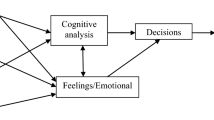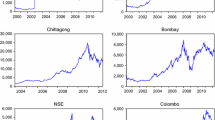Abstract
Finance is based on rational behavior assumption. Thus, the existence of day-of-weekend anomaly in the market can be the anti thesis of the assumption. Much research suggested the role of psychology as the explanation of this anomaly. However, it is rare to find a research investigating the relationship between psychology and day-of-week anomaly (DOWA). As one of the psychology factors is weather-induced mood, this research aims to investigate the relationship between weather cycle and DOWA. This paper used Indonesia average temperature level from 1999 up to 2009 for determining the proxy of moods; and found temperature level does not explain the market returns movements. Temperature level influences the DOWA implying the moods of investor establish the irrational behavior of the market. This result can be used as the explanation of irrationality behavior of investor on Monday. Further research is needed in term of investigating the relationship between psychology factors (need for cognition, heuristic bias, information ignorance, and other factors) and investor behavior.
Similar content being viewed by others
References
Abraham A., Ikenberry D.L. (1994) The individual investor and the weekend effect. The Journal of Financial and Quantitative Analysis 29(2): 263–277
Basher S. A., Sadorsky P. (2006) Day-of-the-week effects in emerging stock markets. Applied Economics Letters 13(10): 621–628. doi:10.1080/13504850600825238
Basu R., Samet J. M. (2002) Relation between elevated ambient temperature and mortality: A review of the epidemiologic evidence. Epidemiologic Reviews 24: 190–202
Bell P.A., Greene T.C., Fisher J.D., Baum A. (2003) Environmental Psychology. Belmont, Wadsworth
Berument H., Kiymaz H. (2001) The day of the week effect on stock market volatility. Journal of Economics and Finance 25(2): 181–193
Bray M. M., Savin N. E. (1986) Rational expectation equilibria, learning, and model specification. Econometrica 54(5): 1129–1160
Cao M., Wei J. (2005) Stock market returns: A note on temperature anomaly. Journal of Banking & Finance 29: 1559–1573
Chang T., Nieh C.-C., Yang M. J., Yang T.-Y. (2006) Are stock market returns related to the weather effects? Empirical Evidence from Taiwan. Physica A 364: 343–353
Clare A.D., Psaradakis Z., Thomas S.H. (1995) An analysis of seasonality in the U.K. equity market. The Economic Journal 105(429): 398–409
Damodaran A. (1989) The weekend effect in information releases: a study of earnings and dividend announcement. Review of Financial Studies 2(4): 607–623. doi:10.1093/rfs/2.4.607
DeBondt W.F.M., Thaler R.H. (1995) Financial decision making in markets and firrns: A behavioral perspectives. In: Jarrow, et al (Ed.) Handbooks in Operation Research and Management, 9th Edition. Amsterdam, Elsevier Science, North Holland
Dimson E., Mussavian M. (1998) A brief history of market efficiency. European Financial Management 4(1): 91–103
Dowling M., Lucey B. M. (2004) Weather, biorhytms, beliefs, and stock returns. International Review of Financial Analysis 14(3): 337–355. doi:10.1016/j.irfa.2004.10.003
Forster P. M. F., Solomon S. (2003) Observations of a “weekend effect” in diurnal temperature range. Proceedings of the National Academy of Sciences of the United States of America 100(20): 11225–11230
French K. R. (1980) Stock returns and the weekend effect. Journal of Financial Economics 8: 55–69
French K., Roll R. (1986) Stock return variances: The arrival of information and the reaction of traders. Journal of Financial Economics 17: 5–26
Goetzmann, W., & Zhu, N. (2003). Rain or shine: Where is the weather effect? Working Paper, Yale University.
Goetzmann W., Zhu N. (2005) Rain or shine, Where is the weather effect?. European Financial Management 11(5): 559–578. doi:10.1111/j.1354-7798.2005.00298.x
Gujarati, D., & Porter, D. (2009). Essential of Econometrics, 4th Edition, McGraw-Hill/Irwin.
Hansen A., Bi P., Nitschke M., Ryan P., Pisaniello D., Tucker G. (2008) The effect of heat waves on mental health in a temperate Australian city. Environmental Health Perspective 116(10): 1369–1375
Hechter M., Kanazawa S. (1997) Sociological rational choice theory. Annual Review of Sociology 23: 191–214
Hirshleifer D., Shumway T. (2003) Good day sunshine: Stock returns and the weather. The Journal of Finance 58(3): 1009–1032
Howarth E., Hoffman M. S. (1984) A multidimensional approach to the relationship between mood and weather. British Journal of Psychology 75(February): 15–23
Isen A., Shalker T. E., Clark M., Karp L. (1978) Affect, accessibility of material in memory and behavior: A cognitive loop?. Journal of Personality and Social Psychology 36: 1–12
Jacobsen B., Marquering W. (2008) Is it the Weather?. Journal of Banking and Finance 32(4): 526–540
Jaffe J., Westerfield R. (1985) The week-end effect in common stock returns: The international evidence. The Journal of Finance 40(2): 433–454
Jaffe J.E., Westerfield R., Ma C. (1989) A twist on the Monday effect in stock prices: Evidence from the U.S. and foreign stock markets. Journal of Banking & Finance 13(14–15): 641–650
Kamstra, M. J., Kramer, L. A., & Levi, M. D. (2000). Winter blues: Seasonal Affective Disorder (SAD), the January effect, and stock market returns, Working paper, Faculty of Commerce, University of British Columbia.
Kovats R. S., Ebie L. K. (2006) Heatwaves and public health in Europe. The European Journal of Public Health 16(6): 592–599
Kramer W., Runde R. (1997) Stocks and the weather: An exercise in data mining or yet another capital market anomaly?. Empirical Economics 22: 637–641
Lo, A. W., & Repin, D. V. (2001). The psychophysiology of real time financial risk processiog. Sloan Working Paper 4223.01, MIT Sloan School of Management, Cambridge, MA.
Maccini, s. & Yang, D. (2008). Under the Weather: Health, Schooling, and Economic Consequences of Early-Life Rainfall. NBER Working Paper, No.W14031.
Malkiel B.G. (2003) The efficient market hypothesis and its critics. The Journal of Economic Perspectives 17(1): 59–82
Matzarakis A., Mayer H., Iziomon M.G. (1999) Application of a universal thermal index: Physiological equivalent temperature. International Journal of Biometerol 43: 76–84
McAndrew F. T. (1993) Environmental psychology. International Thompson Publishing, Johannesburg
Pardo A., Valor E. (2003) Spanish stock returns: Where is the weather effect?. European Financial Management 9(1): 117–126
Rick S., Loewenstein G. (2004) The role of emotion in economic behaviour. In: Lewis, et al (Ed.) Handbook of Emotions, 3rd Edition. Guildford Publication Inc, New York
Ritter J. R. (2003) Behavioral finance. Pacific-Basin Finance Journal 11(4): 429–437
Saunders E. M. Jr. (1993) Stock prices and Wall Street weather. The American Economic Review 83(5): 1337–1345
Schwarz N. (1990) Feelings as information. Informational and motivational functions of affective states. In: Sorrentino R., Higgins E. T., Higgins E. T. (eds) Handbook of motivation and cognition. Guilford Press, NewYork
Schwarz N., Clore G. L. (1983) Mood, misattribution, and judgment of well-being: Informative and directive function of affective states. Journal of Personality and Social Psychology 45(3): 513–523
Shiller R. J. (2003) From efficient markets theory to behavioral finance. The Journal of Economic Perspectives 17(1): 83–104
Sias R.W., Starks L.T. (1995) The day of the week anomaly: the role of institutional investors. Financial Analysts Journal 51(3): 58–67
Simon H. A. (1976) Administrative behaviour. MacMillan Publishing Co., New York
Thaler R. H. (1987) Anomalies: The January effect. Journal of Economic Perspectives 1: 197–201
Tong W. (2000) International evidence of weekend anomalies. Journal of Financial Research 23(4): 495–522
Trombley M. A. (1997) Stock prices and Wall Street weather: Additional evidence. Quarterly Journal of Business and Economics 36: 11–21
Tufan E. (2004) Do cloudy days affect stock exchange returns: Evidence from Istanbul Stock Exchange. Journal of Naval Science and Engineering 2(1): 117–126
Tufan, E., & Hamarat, B. (2003). Weather effect: An evidence from Turkish Stock Exchange. Anadolu University Working Paper no. 2003–68. Available at SSRN: http://ssrn.com/abstract=463880 or doi:10.2139/ssrn.463880.
Wong K. A., Yuanto K. (1999) Short-term seasonalities on the Jakarta Stock Exchange. Review of Pacific Basin Financial Markets and Policies 2(3): 357–398. doi:10.1142/S0219091599000205
Wong W.-K., Agarwal A., Wong N.-T. (2006) The disappearing calendar anomalies in the singapore stock market. The Lahore Journal of Economics 11(2): 123–140
Yahyazadehfar, M., Abounoori, E., & Shababi, H. (2006). Days-of-week effect on Tehran Stock Exchange returns: An empirical analysis. Iranian Economic Review, 11(6).
Author information
Authors and Affiliations
Corresponding author
Rights and permissions
About this article
Cite this article
Brahmana, R.K., Hooy, CW. & Ahmad, Z. Weather, investor irrationality and day-of-the-week anomaly: case of Indonesia. J Bioecon 14, 129–146 (2012). https://doi.org/10.1007/s10818-011-9107-z
Published:
Issue Date:
DOI: https://doi.org/10.1007/s10818-011-9107-z




